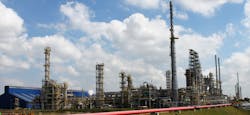Petrobras set for new gasoline specs, will test renewable diesel production at REPAR
Petróleo Brasileiro SA’s (Petrobras) refineries are prepared to produce gasoline that will comply with new regulatory specifications for fuel by Brazil’s Agência Nacional do Petróleo e Biocombustível (ANP) scheduled to take effect in August 2020.
“Petrobras is already ready to produce this new gasoline. The new specification is welcome and will bring the quality of the fuel sold in Brazil closer to that of the American and European market. The intrinsic quality of gasoline will increase in terms of octane and specific mass, which means a more efficient fuel and better protection for vehicle engines. This will allow a reduction in gasoline consumption per kilometer traveled,” said Anelise Lara, Petrobras’s director of refining and natural gas, in Associação Brasileira de Engenharia Automotiva’s (AEA) June 23 live Youtube broadcast entitled “Sustainable Mobility and the Future of Fuel.”
Unlike Brazil’s current regulations that do not require a minimum mass for gasoline sold in the country, the forthcoming specification, Resolução ANP 807/20—the second phase of which will take effect in January 2022—establishes that regular gasoline, whether produced in Brazil or imported, must have a minimum specific mass of 715 kg/cu m. The new specification also establishes the need for a minimum octane rating of 92 research octane number (RON), more appropriate to new engine technologies already being introduced in the country, Petrobras said in a June 24 release.
Alongside confirming preparedness of Petrobras’s refining system to meet the new fuel requirements, Lara also said that, starting in July, Petrobras will begin carrying out production tests for renewable diesel at its 208,000-b/d Presidente Getúlio Vargas (REPAR) refinery in Araucária, Paraná.
“The economic viability of renewable diesel depends on its recognition in compliance with the rule of adding biofuels to diesel, a subject that is currently under discussion at the ANP. This will allow an increase in the competitiveness of biofuels for the diesel cycle,” said Lara.
Adoption of renewable paraffinic diesel (HVO)—which, also known as green diesel, improves performance of engines by helping prevent clogging of filters, pumps, and injectors—not only would help supply—together with existing biodiesel production—the portion of biofuel that must be mixed with diesel sold at Brazilian service stations, but also would support Brazil in achieving the P8 phase of its air pollution control program for motor vehicles (Programa de Controle da Poluição do Ar por Veículos Automotores; Proconve) applicable to new on-road heavy-duty vehicles taking effect in phases during 2022-23, Petrobras said.
HVO can be produced in dedicated plants or via coprocessing of renewable raw material (vegetable oil, animal fats) together with mineral diesel in units inside oil refineries using Petrobras’s proprietary H-Bio process.
Unlike biodiesel produced by the simpler process of transesterification—in which vegetable oil or animal fat reacts with an alcohol in the presence of catalysts—the H-Bio process—in which vegetable oil and petroleum distillate is mixed in a hydrotreating unit—results in a more stable renewable diesel, according to the operator.
While it disclosed no further details regarding REPAR’s production tests for renewable diesel, Petrobras did confirm any entry of such fuel into the market will still depend on regulation by the ANP.
About the Author
Robert Brelsford
Downstream Editor
Robert Brelsford joined Oil & Gas Journal in October 2013 as downstream technology editor after 8 years as a crude oil price and news reporter on spot crude transactions at the US Gulf Coast, West Coast, Canadian, and Latin American markets. He holds a BA (2000) in English from Rice University and an MS (2003) in education and social policy from Northwestern University.

